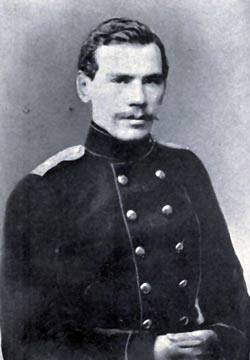Leo Tolstoy Archive
Written: 1912
Source: The Forged Coupon: And Other Stories, by Leo Tolstoy, 1912, Translated from the Russian by Herman Bernstein, published by Ogilvie Publishing Company, 57 Rose Street, New York, produced for Gutenberg.org by Judith Boss and David Widger, 2006.
Transcription/Markup: Andy Carloff
Online Source: RevoltLib.com; 2021

Peter Nikolaevich Sventizky did his best to discover who had stolen his horses. He knew somebody on the estate must have helped the thieves, and began to suspect all his staff. He inquired who had slept out that night, and the gang of the working men told him Proshka had not been in the whole night. Proshka, or Prokofy Nikolaevich, was a young fellow who had just finished his military service, handsome, and skillful in all he did; Peter Nikolaevich employed him at times as coachman. The district constable was a friend of Peter Nikolaevich, as were the provincial head of the police, the marshal of the nobility, and also the rural councilor and the examining magistrate. They all came to his house on his saint’s day, drinking the cherry brandy he offered them with pleasure, and eating the nice preserved mushrooms of all kinds to accompany the liqueurs. They all sympathized with him in his trouble and tried to help him.
“You always used to take the side of the peasants,” said the district constable, “and there you are! I was right in saying they are worse than wild beasts. Flogging is the only way to keep them in order. Well, you say it is all Proshka’s doings. Is it not he who was your coachman sometimes?”
“Yes, that is he.”
“Will you kindly call him?”
Proshka was summoned before the constable, who began to examine him.
“Where were you that night?”
Proshka pushed back his hair, and his eyes sparkled.
“At home.”
“How so? All the men say you were not in.”
“Just as you please, your honor.”
“My pleasure has nothing to do with the matter. Tell me where you were that night.”
“At home.”
“Very well. Policeman, bring him to the police-station.”
The reason why Proshka did not say where he had been that night was that he had spent it with his sweetheart, Parasha, and had promised not to give her away. He kept his word. No proofs were discovered against him, and he was soon discharged. But Peter Nikolaevich was convinced that Prokofy had been at the bottom of the whole affair, and began to hate him. One day Proshka bought as usual at the merchant’s two measures of oats. One and a half he gave to the horses, and half a measure he gave back to the merchant; the money for it he spent in drink. Peter Nikolaevich found it out, and charged Prokofy with cheating. The judge sentenced the man to three months’ imprisonment.
Prokofy had a rather proud nature, and thought himself superior to others. Prison was a great humiliation for him. He came out of it very depressed; there was nothing more to be proud of in life. And more than that, he felt extremely bitter, not only against Peter Nikolaevich, but against the whole world.
On the whole, as all the people around him noticed, Prokofy became another man after his imprisonment, both careless and lazy; he took to drink, and he was soon caught stealing clothes at some woman’s house, and found himself again in prison.
All that Peter Nikolaevich discovered about his gray horses was the hide of one of them, Beauty, which had been found somewhere on the estate. The fact that the thieves had got off scot-free irritated Peter Nikolaevich still more. He was unable now to speak of the peasants or to look at them without anger. And whenever he could he tried to oppress them.